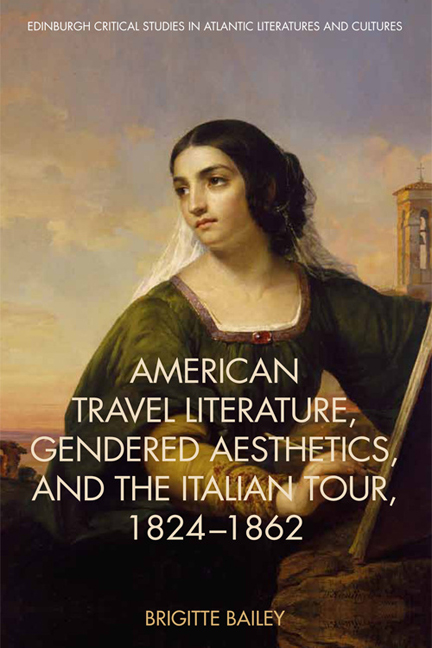Book contents
- Frontmatter
- Contents
- Illustrations
- Acknowledgments
- Introduction
- 1 Irving's Landscapes: Aesthetics, Visual Work, and the Tourist's Estate
- 2 The Protected Witness: Cooper, Cole, and the Male Tourist's Gaze
- 3 Gazing Women, Unstable Prospects: Sedgwick and Kirkland in the 1840s
- 4 Fuller and Revolutionary Rome: Republican and Urban Imaginaries
- 5 National Spaces, Catholic Icons, and Protestant Bodies: Instructing the Republican Subject in Hawthorne and Stowe
- Conclusion: Gender and Genre
- Notes
- Bibliography
- Index
4 - Fuller and Revolutionary Rome: Republican and Urban Imaginaries
Published online by Cambridge University Press: 10 May 2023
- Frontmatter
- Contents
- Illustrations
- Acknowledgments
- Introduction
- 1 Irving's Landscapes: Aesthetics, Visual Work, and the Tourist's Estate
- 2 The Protected Witness: Cooper, Cole, and the Male Tourist's Gaze
- 3 Gazing Women, Unstable Prospects: Sedgwick and Kirkland in the 1840s
- 4 Fuller and Revolutionary Rome: Republican and Urban Imaginaries
- 5 National Spaces, Catholic Icons, and Protestant Bodies: Instructing the Republican Subject in Hawthorne and Stowe
- Conclusion: Gender and Genre
- Notes
- Bibliography
- Index
Summary
I … went forth to seek the Republic. Over the Quirinal I went, through the Forum to the Capitol. There was nothing to be seen except the … [statue of the] emperor …, a few dirty bold women, … Murillo boys in the sun … [and] all the horrible beggars … as usual… . At last the procession mounts the Campidoglio… . One of [the Deputies] reads … the following words …
The form of Government of the Roman State shall be a pure Democracy, and will take the glorious name of Roman Republic.
… The crowd shouted, viva la Republica! viva Italia!
The … grandeur of the spectacle to me gave new force to the thought that already swelled my heart … and I longed to see in some answering glance a spark of Rienzi, a little of that soul which made my country what she is. The American at my side remained impassive.
Margaret FullerMargaret Fuller was unusual among American travelers in the late 1840s in her decision to remain in Rome throughout the revolutionary period of 1847–9, in the depth of her personal and political immersion in Rome, and in her ability, honed in her U.S. writings, to function as a transnational public intellectual, as Charles Capper has argued, whose dialectical and cosmopolitan approach to culture and politics shaped her dispatches to the New-York Tribune. Her equally dialectical work as a gender theorist in Woman in the Nineteenth Century (1845), to return to Christina Zwarg's point, led Fuller to understand the power of cultural binaries and to develop strategies for deconstructing such mutually constitutive ideological categories as male/female or United States/Italy. In his reading of Fuller's intellectual and psychological development, Jeffrey Steele connects her gender analysis with her ability to theorize the reclaiming of political power. Noting Fuller's use of the language of idolatry in her discussion of the ways in which “indoctrination within an ideology of white male supremacy” led women to inhabit “idolatrous relationships” with fathers, husbands, and other male figures, Steele defines this idolatry as the incorporation of images of patriarchal power (“male idols”) within female psyches, an incorporation which leads to passivity, abjection, and melancholy.
- Type
- Chapter
- Information
- Publisher: Edinburgh University PressPrint publication year: 2018



